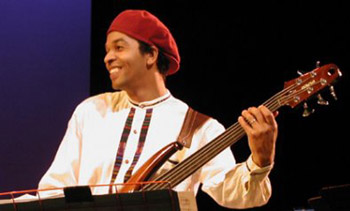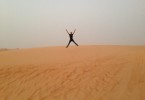If people have a sense of responsibility for the outcome of a situation, it will lift up the human race to deal with everything, even global warming. – Kai Eckhardt
Last weekend visionary musician Kai Eckhardt presented/performed at the 2009 Bioneers Conference. Perfect time to dig up excerpts from an interview I did with him in 2005, during a period of great darkness. In it, he speaks of the power within each of us to use creative expression and our imagination to change the social and psychological dynamics that have put our planet in such peril. Looking back at that time it’s astonishing how far we have come in four short years and it gives me hope that with our reawakened collective energy for peace, collaboration, and justice, we will continue to transform toward a more sustainable world, both physically and spiritually.
From the Bioneers program:
Kai Eckhardt is a renowned musical figure. A Liberian/German bassist, his illustrious three-decade career has seen him collaborate with many of our era’s greatest musicians. Currently a professor at the Jazz School Institute in Berkeley, California, Kai teaches workshops worldwide, and is also very active in social justice and environmental issues. He has helped put together benefits for the homeless, rallies for green collar jobs, poetry projects featuring socially conscious messages and is a proud member of Greenforall.org.
![]()
If the blues comes I tell myself: Pain is also energy. Use it! – Kai Eckhardt
Sven Eberlein: In your biography it is mentioned that the last few years you’ve been more and more interested in art as transformation, as a vehicle that can overcome all the divisions between humans. Do you feel like we are all in this together, on a level that’s beyond our physical realities?
 Kai Eckhardt: Yes, I really believe so. John McLaughlin, for instance, believes if there is a trio on stage, this trio has to connect first as a unit, and then draw people and their intentions in. Then people will connect to that and have a positive experience to a degree where they can walk home from a concert and have an added sense of problem-solving skills and feeling at ease with who they are. The purpose of art is to provide a healing environment for humanity in which people can breathe and feel save.
Kai Eckhardt: Yes, I really believe so. John McLaughlin, for instance, believes if there is a trio on stage, this trio has to connect first as a unit, and then draw people and their intentions in. Then people will connect to that and have a positive experience to a degree where they can walk home from a concert and have an added sense of problem-solving skills and feeling at ease with who they are. The purpose of art is to provide a healing environment for humanity in which people can breathe and feel save.
SE: Does music have the power to bring about political change and do you think musicians should speak out against injustices or just let their instruments speak?
KE: This goes back to art and social change, the responsibility of the artist to be at the center of the paradigm shift. How can we have a good time as people, despite the fact that some of us are black or white, some of us are Indian, some are poor, some of us healthy, some have a disease, some have money, some don’t, and how do we get over these negative emotions that we project onto each other. I believe that if we could harmonize our energy as human beings, being a collective force, you would see an amazing and beautiful transformation, the alleviation of a lot of pain that would lift people up. What is happening is that we’re directing negativity against each other, we’re blaming each other for our own misery. It happens on a family level, on a community level, and on a national and international level. It’s energy directed toward its own center, unable to flow. I always look at the human race as being an individual organism. One creative and powerful approach to solving these problems is to initiate dialogue between people of different backgrounds through the use of images. This is an anonymous way of people relating their experiences to each other. For example, for our upcoming Garaj Mahal shows a screen will be set up so the band as well as the audience can see the it. We sent an email to our fans: “We want to know your feelings about the new year, and can you represent your feelings in one image.” Within one week 200 jpgs came in…
SE: Like art, collages and photos…?
KE: Yes. This is a simple initial step for people to relate their emotions without any censorship. Because it’s anonymous it goes right back to that collective ritual of purging yourself from the things you struggle with on the inside by putting them on the outside. So while you’re trancing out in the audience you’re actually looking at yourself and you also get the chance to see what’s going on in other people’s heads. If you consider this as Step One, the second step would be for people to draw themselves using these images. For instance, you could take a group of people coming together to solve a community problem and say “let’s set up an almost constitutional set of topics related to the pictures shown”. One of them could be “What is my worst problem right now.” Now that would be a very intimate picture, right? Since it’s anonymous you can represent your picture without revealing your identity. You can have that series followed by “What are our blessings, what are the things we can be proud of?” Then the next image could be “What is the first step toward a solution?” Again, can you see the collective subconscious at work here?
SE: It’s like working with archetypes.
KE: Yes, exactly! You call up the archetypes through the event. You can say “Represent yourself in three pictures – where you came from, where you are now, and where you are going.” That would be a way people could get to know each other, and I have the feeling that even though people in the room don’t know who put up what image, the emotions they emanate while they see their pictures are still the same as if they were talking to somebody. That’s the value of it, this release. If somebody could create an event and do it really specifically, intelligently and sensitive to the human condition, one could take that event as a type of precursor to a serious debate where people come together to really solve problems. This is something I learned from the Africans. When the Africans have a serious problem they call all the spirits that know about the problem. In rituals they have shamans dress up as the problem who act out the problem in this wild way, and everybody goes “yeah, and this husband did this to that woman, and here comes this entity.” They all get emotionally worked up, and then finally they sit down and talk. Western culture did away with that. It said “let’s just elect a few people and have them be the representatives of our problems. Once we elect them they can do whatever they want.”
SE: And we approach music in the same way, we create this spectacle where we put musicians up on a big stage and say: “Entertain us!”
KE: Yes, and I don’t want that. I want to do everything I can to dissolve that. I want people to come to a show thinking “I am making this show happen tonight, I am coming with my own energy and I am going to make it happen.” If people have that kind of confidence and that kind of sense of responsibility for the outcome of the situation, it will lift up the human race to deal with everything, even global warming. Even if there is such a thing as the apocalypse, you know the end times, if we reach that threshold with integrity there will be that sense of “wow, we are all together now.”
SE: Seems like there is a big wave of people who don’t believe in that dogma anymore and realize that we’re just accumulating karma, all the stuff that’s happening in Iraq and Afghanistan, it’ll just keep coming. Our leaders always speak of power as in who has the biggest weapon, but what about the power of wisdom?
KE: I feel like not everyone is ready for it, nor can I tell a mother or father what to do or think if their child is killed, because I know that’s my worst nightmare. In a way you have to be careful to not be a snob either, as in “oh, you don’t have the power to forgive.” No, I have to say “this is real injury”, and so the harder the situation that we’re in as people, the greater the opportunity to show greatness. It’s easy for me to be cool and balanced if I have more money than I need and all my bills are paid every month. But if I’m struggling to survive, incurring debt, and my family is sick and I’m burned out from the road, in that state of mind my world shrinks and I am overpowered by a strong life-negating emotional undercurrent. I react instead of responding carefully. This is universal and every human will feel this undertow in a stressful situation. There is a pull toward entropy coming from the day to day experience of what seems hopeless. To overcome the chronic effect of long-term struggle is the top challenge. Well to do people with a cushioned lifestyle for the most part don’t understand that. This is one of the reasons people in challenged positions feel humiliated and insulted by the condescending attitudes of the rich, the privileged, the often careless, and the mostly clueless. Nevertheless we all have the power to move away from the downward spiral and to use the power of our consciously directed will in order to defeat misery. And before we can do that we have to assume responsibility and admit to mistakes of the past. After that we have to go through the labor of actually defining what we really want. Then we have to create a sensible plan to pre-empt chronic problems, eventually overcoming them. No plan — no escape from Negativeland. I have been there more than once and I have learned my lesson. Thankfully I am blessed with an amazing wife and wonderful children. Nowadays despair is not an option. I owe it to them. If the blues comes I tell myself: Pain is also energy. Use it! I now use that energy to create something productive. A new piece of music, a poem, an action plan, an act of courage. A meaningful gesture, an ordeal, a sacrifice. I have tried it. It works.
SE: If you had to describe your role in this world in just a few words, what would it be?
KE: To be a decent person, a decent father, a decent husband, a decent musician in the eyes of eternity. To be a refined mirror that reflects the boundless infinity of the universe in which I live and die. To never stop evolving in life, to be a great provider, to be at peace with myself regardless of the circumstances, to have fun. To be loving and to inspire faith in humanity beyond the call of duty.
![]()








Wow, beautiful man, this Kai Eckhardt; and a great writer who, I realize, did a lot of work to bring this interview to be. I envy your very interesting life, Sven. Wow! Inspiring and meaningful (of course!)
Thanks Pam. It was one of the greater honors of my life to sit down with Kai. At the time there wasn’t much editorial interest in his ideas for peace and transformation, but what I like about the conversation is that it is pretty timeless, thus I put it out there. Maybe it’ll catch a second wind, as the ideas espoused seem to be much more widespread just a few short years later. In fact, I feel them every time I travel the notesalongthepath. 🙂